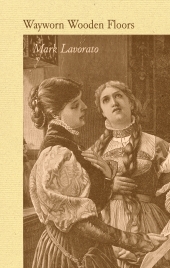The Porcupine's Quill
Celebrating forty years on the Main Street
of Erin Village, Wellington County
BOOKS IN PRINT
Wayworn Wooden Floors by Mark Lavorato
Mark Lavorato’s debut poetry collection, Wayworn Wooden Floors, is a striking piece of work, informed by an acute observer tuned to the everyday. These frank, thoughtful poems evoke both the tragedy and the comedy endemic to daily existence. Lavorato’s poems are penned in accessible, unpretentious verse, which is as clear as it is varied in form, tone, and vantage.

Multi-hyphenate Mark Lavorato draws on his skill as a novelist, composer, and photographer in this collection, rewarding readers with poignant, emotionally-genuine vignettes. The author composed much of the collection over the course of a thousand kilometre trek, the experience of which he channels through ‘on the trail’ verse. The exotic locales he has experienced colour some part of the freshness of the imagery throughout, while his interpretations of our history, and our struggles, infuse the diction with clarity and immediacy.

2013—Raymond Souster Award,
Shortlisted
Table of contents
This World
Woman Eating an Apple
Sorry
To You, Mrs. Woolf
Happiness
A Handful of Seeds
Plea
Three Colours
Oaxaca City
Postcards
Conflict Resolution
The Morning After the Canadiens Lost
Vézère
Five Perspectives of a Church
To Mrs. Koran
Google Earth
Dawn
Sundays
D
Maps of Antiquity
Rose
True Patriot Love
Vertigine
Recordar
There is a bench
Fingerpaintings
Arriving First
Geese
Aerial Calculations
Flight Path
Present
Harbour Seal
The Old Woman Living Opposite
Uschi
Sierra de Chuacús
Where He Put Them
Novembrance Day
Abandoned Farm
Abandoned Car
Abandoned Resort
Abandoned Toys
Abandoned Grave
Carpenter Ant
Discovering Smallness
Camino de Santiago
The Shades of your Black
Fireside Conversation
A Crab on Vargas Island
Ninth Street North
Nonna
Unearthing Another Temple
How to Make a Cake from Scratch
I Used to Believe
Review quote
‘Wayworn Wooden Floors is insightful and much recommended addition to many a modern poetry collection.’
—Wisconsin Bookwatch
Review quote
‘Throughout [Wayworn Wooden Floors], Lavorato plays with a variety of forms, giving readers an opportunity to be active as well as passive recipients of his words. We are never complacent and he is not predictable.’
—Carol Katz, Poetry Quebec
Review quote
‘Wayworn Wooden Floors is a varied first collection of many styles and themes ranging from terse lyrical imagery to verbose prosaic description. While his voice is consistent and strong, the styles are wide ranging and vigorous.’
—Philip K. Thompson, The Chronicle Herald
Review quote
‘[Mark Lavorato’s] powers of description and his obvious facility with words serve him well ... from a “desert of saturate light” (“Swallow”) to the “Sun dangling bald from an unseen wire, gestapo-bulb sway” (“Ninth Street North”).’
—Michael S Begnal, Eyewear
Review quote
‘From Oaxaca City to the streets of Montreal to an abandoned farm where “The sound of the wind is defined / only by what it blows through”, these poems are less postcards than personal memories mined for greater, universal truths.’
—The Montreal Review of Books
Review quote
‘His poetry is his own, and clearly understandable. What you read is what you get, and the reverse is equally true. Lavorato writes with an eye to the last line of a poem, and that line is loaded with irony.’
—Andrew Vaisius, Prairie Fire Review of Books
Review quote
‘[Wayworn Wooden Floors is] like a magnifier to our everyday life, finding all the remarkable little things we ignore, from the quiet respite of Sundays, to the silent wisdom of a Church janitor.’
—Angelique, Maple Books
Previous review quote
[For previous novel, Veracity]
‘Mark Lavorato’s Veracity is a provocative first novel that succeeds in creating a realistic future-world that is rife with darkness, excitement, thought, and adventure. [...] The message is starkly cautionary and breathlessly told -- a 21st century Brave New World or 1984.’
—Sarah Jensen via Amazon.com
Previous review quote
[For previous novel, Believing Cedric]
‘Believing Cedric is a marvellously strange novel that explores a marvellously normal phenomenon: everyone in our lives has a story. Mark Lavorato writes with great humanity, compassion and curiosity.’
—Todd Babiak, author of Toby: A Man
Author comments
I am drawn to the idea that poetry is simply the everyday, which, as a matter of perspective, has become, unexpectedly, song-worthy. I have included a few lofty ideas in the collection, but the vast majority of it is comprised of fairly ordinary events that are examined and placed under the microscope in a lofty way. I would like to impress upon readers that their lives are filled with as much poetry as any other. It is simply the magnification and the Petri dish that make it verse.
I am hopeful that someone who enjoys poetry will pick this book up and appreciate its forms and themes and construction. But I would also love to have someone who has never bought a collection of poetry before pick it up. I would love for someone to be turned onto poetry because of it. I know that’s asking a lot. But I think that the poems throughout are really quite accessible, and for that reason, unintimidating. And I would love for that person to read Wayworn Wooden Floors, and in doing so, see that poetry -- arguably the world’s oldest art form -- is something that has been around forever for a reason. Namely that it pervades everyone’s life, including their own. Yes, I’d like this to be a book that people pass along, dog-ear its corners, spill tea over its cover, pull it out of a backpack, shake off the crumbs, read it again. I would like this book to become as worn as the wooden floors the collection is named after.
Excerpt from book
A Handful of Seeds
My father teared at movies.
His hobby, though,
was taking life.
He told me once, excitedly,
convincing me to try it,
having gently pulled me into a corner
where no one could hear,
that it wasn’t the hunt,
or the challenge, or the meat.
It was the killing.
To take a life from this world
just because you could.
He broke his leg one September,
so couldn’t scour the hills
for savage creatures.
Instead, confounded,
he whittled a branch at
the edge of the forest,
his long cast pointing at the trees.
The autumn wind
fluttered through the clinging leaves
as they slowly
lost
grip.
And gradually, tenderly,
conversely,
he befriended the birds.
He sat for days
with a handful of seeds,
waiting.
And in time, though skittish with caution,
they came. First to the table beside him,
which was only a muffled drum roll away
from the safety of the branches,
and then, edging forward with tiny hops,
eyeing his cupped hand,
suddenly crouching, ready to fly
at the subtlest of movement.
Light feathered bodies
dainty with hollow bones,
hovering like spectators in a gallery,
wrists clasped behind backs,
scrutinizing this study of stillness,
of patience, of silence;
their shining black eyes
solemnly judging.
My father,
like the graveyard statue of a saint,
grinning at birds,
in sunlight as crisp as stone.
Later, his leg having healed,
he plucked his rifle from the corner again,
eager to tame the wild
that had come unleashed unto the world
in his absence.
Still, when I think of him,
it is this image that rises first.
A monument, honouring what he was,
but couldn’t be.
Mouse
(From ‘Five Perspectives of a Church’)
With her second litter of the year nursing
it was the teeming hunger that led her
too far astray from her usual rounds
Which is where she found it
block of endlessly delicious poison
filling her cheeks to a stretch
She didn’t realize the mistake as much
as she did the drunkenness, the
wobbling nave she found herself under
for the very first time, usually
keeping to the dowdy edges of lint balls
and dust, skirting the hardwood trim
in only the deepest candle flicker of night
But now there seemed to be stained-glass
light everywhere above, a scraggly hunch of fur
breathing faster than a panicked pulse
swimmingly lost in the holy wooden open
Her burgundy blood thinning to water
she feels herself spreading, blurring, dividing, as if
beside herself, there were another, equal
presence there, easing her gently to her side
How to Make a Cake from Scratch
First you will need to take out your recipe,
as well as every recipe you’ve ever been given
and burn them. It is critical you disregard
anything anyone has ever told you about making
cake. A jerry can of gasoline and match facilitate.
The ingredients are complex. They will change
when you wish they would not. Avoid gathering
all your favourite tastes and textures. If you do so
the overall flavour will be bland and lack colour.
A zest of lemon in some form or another is best.
Your oven will need stoking, so you must leave
the comfort of your home, and go to the place that you
have been advised never to go. It is a place where the wood
is hard, the soil precarious, the air volatile. Go there.
Stand thin at its centre. Now close your eyes. And begin.
The multi-talented Mark Lavorato was raised on the Canadian Prairies, but has spent most of his adult life living, working, and writing on his travels throughout Central and North America, the Caribbean, and Europe. He was inspired to begin writing while living in the Austrian Alps, reflecting on unsettling true stories he’d heard in the jungles of Guatemala. Aside from his writing, Mark is also a photographer and composer.
For more information please visit the Author’s website »
The Porcupine's Quill would like to acknowledge the support of the Ontario Arts Council and the Canada Council for the Arts for our publishing program. The financial support of the Government of Canada through the Canada Book Fund (CBF) is also gratefully acknowledged.







